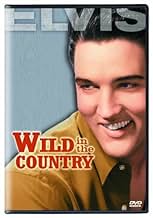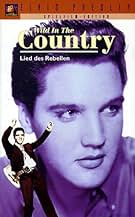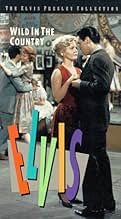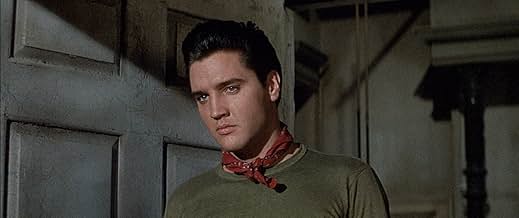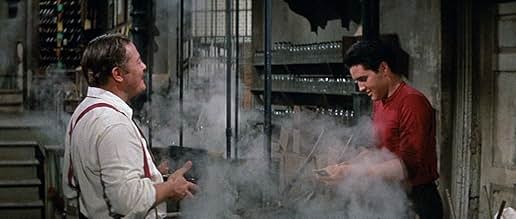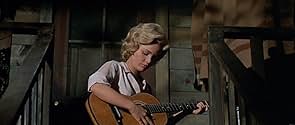IMDb RATING
6.3/10
2.2K
YOUR RATING
A troubled young man discovers that he has a knack for writing when a counselor encourages him to pursue a literary career.A troubled young man discovers that he has a knack for writing when a counselor encourages him to pursue a literary career.A troubled young man discovers that he has a knack for writing when a counselor encourages him to pursue a literary career.
Charles Arnt
- Mr. Parsons
- (uncredited)
Mark Bailey
- Sheriff
- (uncredited)
Walter Baldwin
- Mr. Spangler
- (uncredited)
Joe Butham
- Mr. Dace
- (uncredited)
Pat Buttram
- Mr. Longstreet
- (uncredited)
Harry Carter
- Bartender
- (uncredited)
Linden Chiles
- Doctor
- (uncredited)
- Director
- Writers
- All cast & crew
- Production, box office & more at IMDbPro
Featured reviews
Elvis Presley as a hell-raising juvenile delinquent? I don't think so. That's what `Wild in the Country' would have us believe, but in reality he's the only honest and decent male in the movie. He plays a misunderstood young man from a poor white trash background who is sent to a psychologist as part of his parole after he gets into trouble (which he often does through no real fault of his own, naturally). Hope Lange plays the `older woman,' who discovers a budding literary talent in her charge. However, according to director Philip Dunne's memoirs the part was originally offered to Simone Signoret (!). Contemplating this pairing is more exciting than anything that happens in this movie. Miss Lange gives it a good try, but she was only about 3 years older than Elvis. Signoret would have made a man out of him in no time! This was supposed to be Presley's big dramatic breakthrough in a non-singing role, but according to Dunne, the bosses at Fox insisted upon interpolating songs. The movie also suffers from the Production Code censorship of the time (no actual going to bed with Lange, thank you), and Elvis was too nice to be really bad. Considering all the strikes against it, it's surprising that `Country' is still as watchable as it is. Presley is as good as he's allowed to be, and Tuesday Weld also spices things up as the requisite `bad girl' who tempts him. Call this one a `bad movie to love.'
Apparently Elvis didn't think much of any of his films. According to "Being Elvis", a recent biography by Ray Connolly, Elvis hated the repetitive nature of the plots - same story different location. He felt he had never been given serious roles where he could show what he could do as an actor - he certainly didn't have to compete with Paul Newman and Steve McQueen for the roles in "Fun in Acapulco" and "Girls, Girls, Girls".
Although he definitely had a point about the films toward the end of his Hollywood career, a number of his earlier films were actually based on novels -"King Creole", "Follow That Dream", "Flaming Star" and this one, "Wild in the Country" - stories that had more substance going in.
"Wild in the Country" has elements we expect from an Elvis picture, but then it gets complicated. This was made a few years after James Dean and Sal Mineo had shown that troubled teens were now a fact of life. Elvis plays Glenn Tyler, one of the troubled. After being placed on probation for injuring his brother in a fight, he receives counselling from psychologist, Irene Sperry (Hope Lange).
The not inconsiderable charms of Millie Perkins and Tuesday Weld can't compete when Irene discovers that Glenn has a talent for writing and Glenn discovers that he has feelings for the older woman. In reality, Hope Lange was only two years older than 26 year-old Elvis.
The film has a script by Clifford Odets, although one suspects he would not have considered "Wild in the Country" as his finest hour. He originally had Irene Sperry's character committing suicide at the end, it was changed, but it possibly reflected how Odets felt about selling out to Hollywood.
However the film has a lot going on with well-defined characters and great locations in the Napa valley. If Elvis felt that most of his films only had stories to separate the songs, that was not the case in "Wild in the Country", there are a few songs, but the film is mainly the drama he craved.
I find a lot of his films are fun to watch in the same way as "Beach Party" movies are. But there are a handful of films that have a depth he may not have appreciated at the time - "Wild in the Country" is one of them.
Although he definitely had a point about the films toward the end of his Hollywood career, a number of his earlier films were actually based on novels -"King Creole", "Follow That Dream", "Flaming Star" and this one, "Wild in the Country" - stories that had more substance going in.
"Wild in the Country" has elements we expect from an Elvis picture, but then it gets complicated. This was made a few years after James Dean and Sal Mineo had shown that troubled teens were now a fact of life. Elvis plays Glenn Tyler, one of the troubled. After being placed on probation for injuring his brother in a fight, he receives counselling from psychologist, Irene Sperry (Hope Lange).
The not inconsiderable charms of Millie Perkins and Tuesday Weld can't compete when Irene discovers that Glenn has a talent for writing and Glenn discovers that he has feelings for the older woman. In reality, Hope Lange was only two years older than 26 year-old Elvis.
The film has a script by Clifford Odets, although one suspects he would not have considered "Wild in the Country" as his finest hour. He originally had Irene Sperry's character committing suicide at the end, it was changed, but it possibly reflected how Odets felt about selling out to Hollywood.
However the film has a lot going on with well-defined characters and great locations in the Napa valley. If Elvis felt that most of his films only had stories to separate the songs, that was not the case in "Wild in the Country", there are a few songs, but the film is mainly the drama he craved.
I find a lot of his films are fun to watch in the same way as "Beach Party" movies are. But there are a handful of films that have a depth he may not have appreciated at the time - "Wild in the Country" is one of them.
J.R. Salamanca's book "The Lost Country", adapted for the screen by Clifford Odets (!), becomes decent though somewhat stodgy melodrama featuring Elvis Presley as southern delinquent who shows promise as a writer, counseled by a female psychologist who believes in him. Critics at the time were calling for Elvis to start doing some decent dramatic work, yet when this picture was released it was mostly ignored (it is often cited as the one Presley-vehicle which failed to turn a profit). The females in the cast (Hope Lange, Tuesday Weld and Millie Perkins) are strong screen-matches for Elvis, and the plotting is good when it isn't being overripe. As for the star, he does his typical thing: singing just a few songs, but performing in his usual shy and self-conscious, overly-polite low key. **1/2 from ****
"A troubled young man discovers that he has a knack for writing when a counselor encourages him to pursue a literary career." Do me a favour: Do not think of this movie as any other Elvis flick, because this is one of the best classic films I've seen. Well, he sings a couple songs to his lovers and he gets into a couple of fights, but here it just doesn't happen randomly. The plot is excellent and Elvis blew me away with his acting. There's one specific scene where he's sharing stories about his dead mother with Hope Lange and it almost brought me to tears. His acting was very natural, as was Hope Lange's, Tuesday Weld's and Millie Perkins'. This is a fantastic movie and I hope you'll enjoy it as much as I did.
Wild in the Country is a solid film and one of Presley's best.
Elvis is excellent as a delinquent who happens to be a potentially terrific writer. Psychiatrist Hope Lange helps Elvis achieve his potential and they slowly fall for each other. Elvis only sings a couple of songs here and therefore, instead of a musical, we get a dramatic story that's well acted by all three leads and is genuinely captivating, only falls short towards the end and goes for a sappy conclusion. Overall, one of Presley's best films and he once again proves what a great actor he could have been. 7 out of 10.
Elvis is excellent as a delinquent who happens to be a potentially terrific writer. Psychiatrist Hope Lange helps Elvis achieve his potential and they slowly fall for each other. Elvis only sings a couple of songs here and therefore, instead of a musical, we get a dramatic story that's well acted by all three leads and is genuinely captivating, only falls short towards the end and goes for a sappy conclusion. Overall, one of Presley's best films and he once again proves what a great actor he could have been. 7 out of 10.
Did you know
- TriviaElvis Presley's best performances are invariably cited as his three forays into drama, which were natural matches for his chief acting characteristics: petulance, intensity and hidden vulnerability. Not coincidentally, music takes a back seat in most of these three vehicles. In King Creole (1958), based on the plot about a would-be singer, Presley sings a full score of songs. In Flaming Star (1960), there is just one song in the plot. In Wild in the Country (1961), there is only one 'serenade' per female character. The songs were included largely so that, at the very least, an Extended Play soundtrack album could be released for each film and record sales would not be negatively impacted by the time the dramas took to film. King Creole, of course, was one of the best selling albums of Presley's career, but in the case of both Flaming Star and Wild in the Country, no soundtrack album was released outside of a 45rpm single.
- GoofsIn the Elvis drunk scene, when he douses the window with the water hose, the in-between close up shot of the window pane (showing close up the women inside looking out) has no water residue / dripping: next shot back out to Elvis' stance (still water hose spraying) and it's (rightly) soaked.
- Quotes
Betty Lee Parsons: I have no intention of wasting sympathy on him.
Glenn Tyler: Sympathy is never wasted, Betty Lee. One way or another, you get it back, or so it says in the Book.
- ConnectionsFeatured in Elvis in the Movies (1990)
- SoundtracksWild in the Country
by Hugo Peretti, Luigi Creatore and George David Weiss (as George Weiss)
Performed by Elvis Presley (uncredited)
- How long is Wild in the Country?Powered by Alexa
Details
- Runtime
- 1h 54m(114 min)
- Color
- Sound mix
- Aspect ratio
- 2.35 : 1
Contribute to this page
Suggest an edit or add missing content



